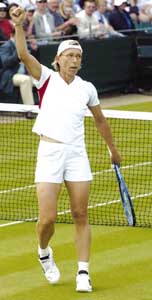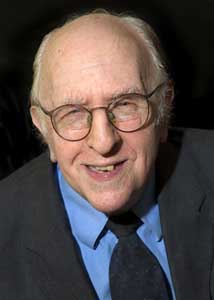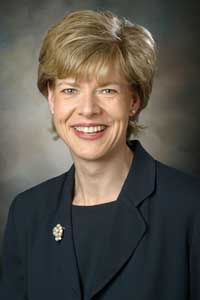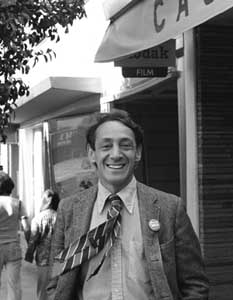-
- California appeals court upholds ban on same-sex marriage
- New effort at routine HIV testing may take years to carry out
- Hastert weathers criticism in House page scandal
- Companies see benefits of being gay-friendly
- Name change sought for University of Missouri student union
- Suburban Chicago superintendent suspended for gag interviews video
- National News Briefs
- World News Briefs
feature
Celebrating Gay History Month
Published Thursday, 12-Oct-2006 in issue 981
On Wednesday, Oct. 18, I will turn 50, and I think it’s a natural time to reflect on the amazing changes that have taken place.
I certainly don’t feel old; I am in better physical condition now than I was 10 years ago, and I don’t have any of the traditional physical symptoms or mid-life crises to report. I’ve taken care of my body and it’s has paid off. Before my retirement from professional tennis last month, I won one last Grand Slam title. What a thrill to end my career on a high note. My partner Bob Bryan and I won mixed doubles at the 2006 U.S. Open. The ball didn’t notice my advancing years, so why should I?
I’ve always said timing is everything, so when I was asked to write this essay about my personal role in the creation of gay history, I felt the timing was right. Now, when I think back on all that has happened within the LGBT community within my lifetime, 50 years no longer seems like an arbitrary interval of time. From my new perspective, I see a half century of events that have added up to incredible changes. And that’s certainly an important reason to stop for genuine reflection.
There was the year that I left my home country, then communist Czechoslovakia, to live in a country where I would be free to chase my dream without the specter of a faceless and menacing government watching my every move, spying on my family, controlling my travels and confiscating most of what I earned. Ironically, today, in the name of protecting our democracy and freedom, my chosen country’s government is behaving a lot like the totalitarian communist regime I left behind.
In 1981, I chose to come out and tell the truth about myself. Although I had no idea of it at the time, I now see that moment of truth as significant not only for my own personal evolution, but, because my life was played out in public, my coming out played a role in the struggle for human rights for all of us. At the time, I wasn’t trying to make a political statement; I wanted to be true to myself. If I couldn’t face my fear, how could I face my opponents? It’s no coincidence that my years of tennis dominance began after I came out. I couldn’t win if I had to leave part of me off the court.
For many years, corporate sponsors wouldn’t touch me. Despite the fact that I was at the top of my sport, I wasn’t asked to endorse products, and I missed out on the lucrative deals that my contemporaries were enjoying. I put that down to simple bigotry. Even today a part of me is still waiting for a call from Wheaties.
One of the most moving moments in my life was participating in the 1993 March on Washington. We spoke our individual truths, but with one voice so loud that we made a safe place for others to do the same. Standing on the stage and looking over the throngs of people, I spoke about how this free place is where we can all do our best and contribute the most. This is where we can really “get in the game.” And if we want to change history, we have to speak our own truths and support others to speak theirs.
I was so inspired by the strength and solidarity I witnessed that I wanted to make the spirit last longer than a weekend. Two years later, two friends and I found a way to harness the economic power of the LGBT community and really make a difference. We launched the Rainbow Card that funds the nonprofit Rainbow Endowment. In essence, we created a fund-raising tool that enables individuals to contribute to the LGBT community through the simple act of using a credit card. With less than 2 percent of all philanthropic dollars in the United States targeted specifically to lesbian and gay causes, the Rainbow Endowment has emerged as one of the nation’s top funding sources for the LGBT community. Through its grant-making program, the Rainbow Endowment has contributed nearly $2 million dollars to organizations empowering the LGBT community.
And, finally, there’s 2006, this amazing year when I was able to participate in the 1st World Outgames in Montreal. It was at this event that I experienced the difference between being tolerated and being accepted. I witnessed, for the first time, a GLBT event that was not organized solely by us, but for our community. I felt that I was no longer part of an embattled group of “outsiders” fighting to be merely tolerated rather than really accepted. For that week in Montreal, everyone was gay. The Outgames weren’t just a GLBT event, they were a Montreal event, a Canadian event, and the Outgames are now on the way to living up to their name as a world event.
When I turn 50, I won’t be alone. Statistics report that one out of 76 million Baby Boomers turns 50 every 7.5 seconds. How refreshing that mathematical calculation becomes when we realize that since the GLBT community is 10 percent of the population, it’s a fact that we are clocking 50th birthday parties at the rate of almost one baby Boomer per minute! If we can focus that energy and economic power, what can’t we accomplish? Timing is everything, and now is our time.
I look forward to making history with you!
One of the founders of the modern American gay rights movement, Frank Kameny brought a radical, take-charge attitude in place of more assimilationist policies that plagued many early gay leaders.
A child prodigy and WWII veteran, Kameny obtained a Ph.D. in astronomy from Harvard University in 1956 and began work for the Army Map Service in 1957. However, mere months into the job, rumors circulated regarding Kameny’s homosexuality, which culminated in his firing from the Map Service and being barred from all civil service jobs, reflecting a McCarthy-era mandate for all homosexuals at the time.
Kameny fought to regain his job for five years, including a personal appeal to the U.S. Supreme Court and a suit against the government, both of which were denied. Finally, in 1961, he decided to join with Jack Nichols to establish a Washington, D.C., version of the homophile group Mattachine Society.
Reflecting both Kameny’s personal priorities and local complaints, the Mattachine Society of Washington, D.C., focused on ending sexual orientation discrimination in civil service positions and the military. It organized the first gay protests in front of the White House in April 1965, in which Kameny, Barbara Gittings and other prominent activists participated. Kameny’s work along with the Mattachine Society eventually led the Civil Service Commission to amend its anti-gay policies in 1975.
Additionally, Kameny advised countless armed services members in coping with anti-gay military policies. Along with his civil and military service radicalism, he battled the American Psychiatric Association in an effort to remove homosexuality as a mental disorder, disrupting the APA annual meeting in 1971 and fostering the eventual removal of homosexuality from its list of illnesses.
To top off an already growing list of achievements, Kameny became the first openly gay person to run for Congress, using the campaign to publicize the issue of unequal government treatment of the community. He is one of the oldest surviving activists and celebrated his 80th birthday last May.
Tammy Baldwin is the only out lesbian in the U.S. House of Representatives. The congress member from Wisconsin’s 2nd District since her election in 1998, Baldwin during her tenure has been a champion of gay rights, as well as a champion for issues like health care, the environment and women’s rights. Her political career has spanned more than two decades, from her beginnings on the Dane County (Wisconsin) Board of Supervisors to her fourth consecutive term in Congress.
Born and raised in her congressional district by her Caucasian mother and African-American stepfather, Baldwin knew from experience at an early age the privilege given to her because of her race, but furthermore the hardships faced as a result of both her gender and her sexuality. She attended Smith College in Massachusetts, majoring in government and mathematics, and immediately after graduation returned home to Wisconsin to begin her political career and attend the University of Wisconsin Law School.
In addition to serving as a Dane County supervisor, Baldwin was a Wisconsin state representative for five years until her election to national office. Many considered her grassroots campaign in 1998 far too liberal, but Baldwin did not compromise, standing strong in her support of universal health care, advanced care for the elderly, public funding for day care programs and stricter environmental standards.
All the issues for which Baldwin stands are the results of her own experiences. Her grandmother had extensive medical expenses which Baldwin helped pay for, shaping her views on health care, specifically for the elderly. Growing up within her mother’s and stepfather’s families helped enlighten her on the importance of family support, an idea she has broached through daycare reform.
But perhaps the largest inspiration for Baldwin’s political career has been her mother, who turned around an addiction to prescription drugs and became a counselor, working with patients suffering from similar addictions. Baldwin, like her mother, has overcome tremendous challenges and become a positive role model for both her Wisconsin constituents and the entire GLBT community.
Eleven months after his inauguration on San Francisco’s Board of Supervisors, Harvey Milk was assassinated along with Mayor George Moscone in City Hall, the victim of a former supervisor’s outrage over the liberal shift in city politics.
Milk was instantly made a martyr of the gay community after his assassination. Sensing the danger of his position within city government, he had created several recorded wills to be played in the event of his assassination. One memorable line is inscribed today in a plaza named for him: “If a bullet should enter my brain, let that bullet destroy every closet door.”
The gunman, Dan White, was eventually charged and convicted of manslaughter, serving only five years in prison and committing suicide shortly thereafter. His trial strategy is infamously known as the “Twinkie Defense,” in which his lawyer argued White’s depression was caused by the large amounts of junk food he had ingested.
The verdict inflamed members of San Francisco’s gay community, and a mob encroached upon City Hall on the evening following the verdict in what was to be known as the White Night Riots. Outraged citizens clashed with police, who took on their own anti-gay agenda, mercilessly beating individuals and destroying property in the largely gay Castro neighborhood.
The following day was Harvey Milk’s birthday and, fearing a second night of rioting, the city permitted Castro Street to be closed in celebration of Milk and his legacy. The celebration went smoothly as individuals spoke on a makeshift stage and disco music filled the air, a fitting tribute to a man named as one of the 100 most influential politicians by Time magazine.
Milk’s political journey ended abruptly, but not without a budding, still-growing legacy. Along with an annual commemorative candlelight march in San Francisco honoring Milk and Moscone, the Harvey Milk High School in New York serves at-risk GLBT youth, and several notable landmarks in San Francisco’s Castro district have been named for him, all of which are a testament to his impact on the community in San Francisco and across the country.
|
|
Copyright © 2003-2025 Uptown Publications





